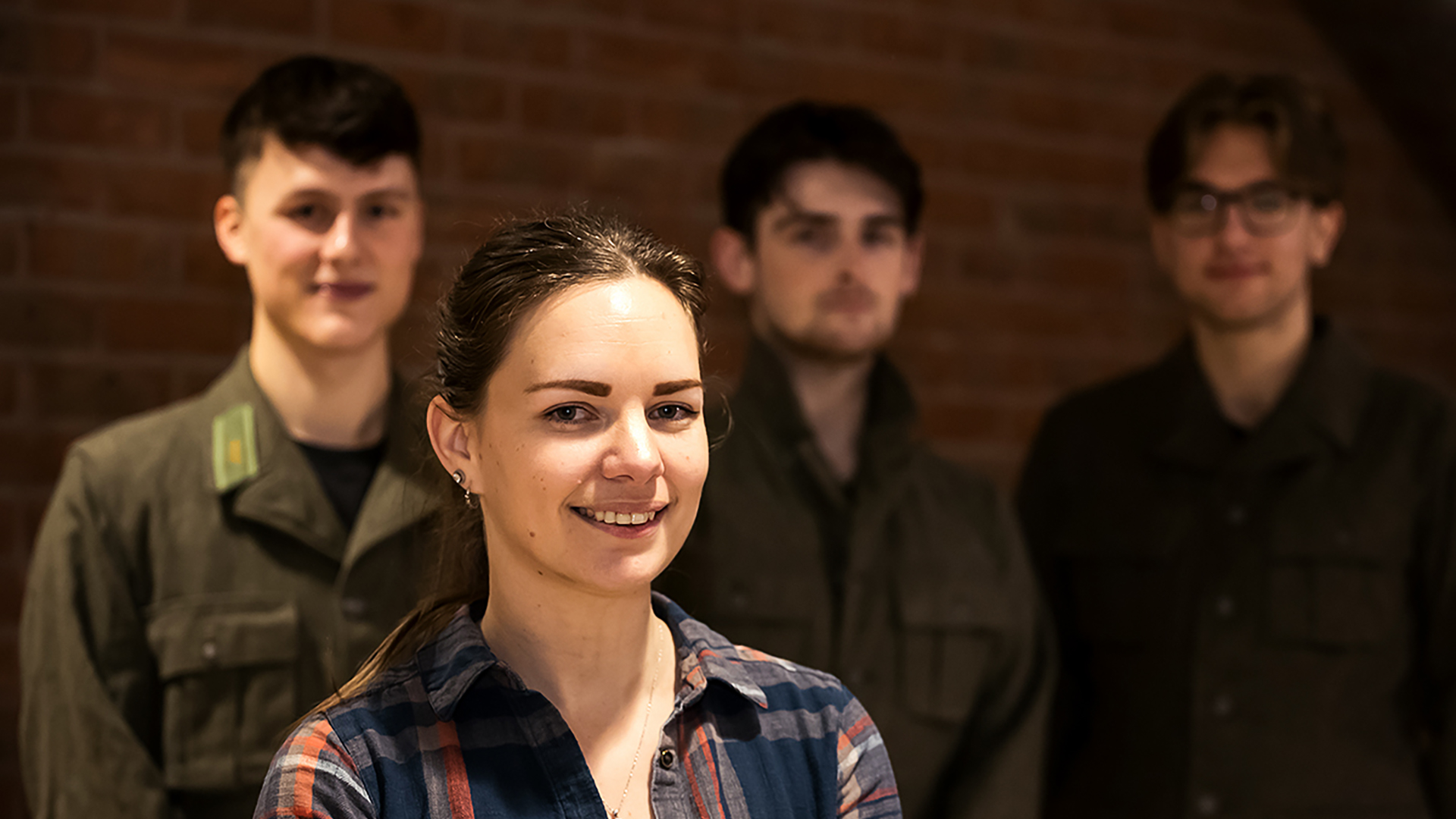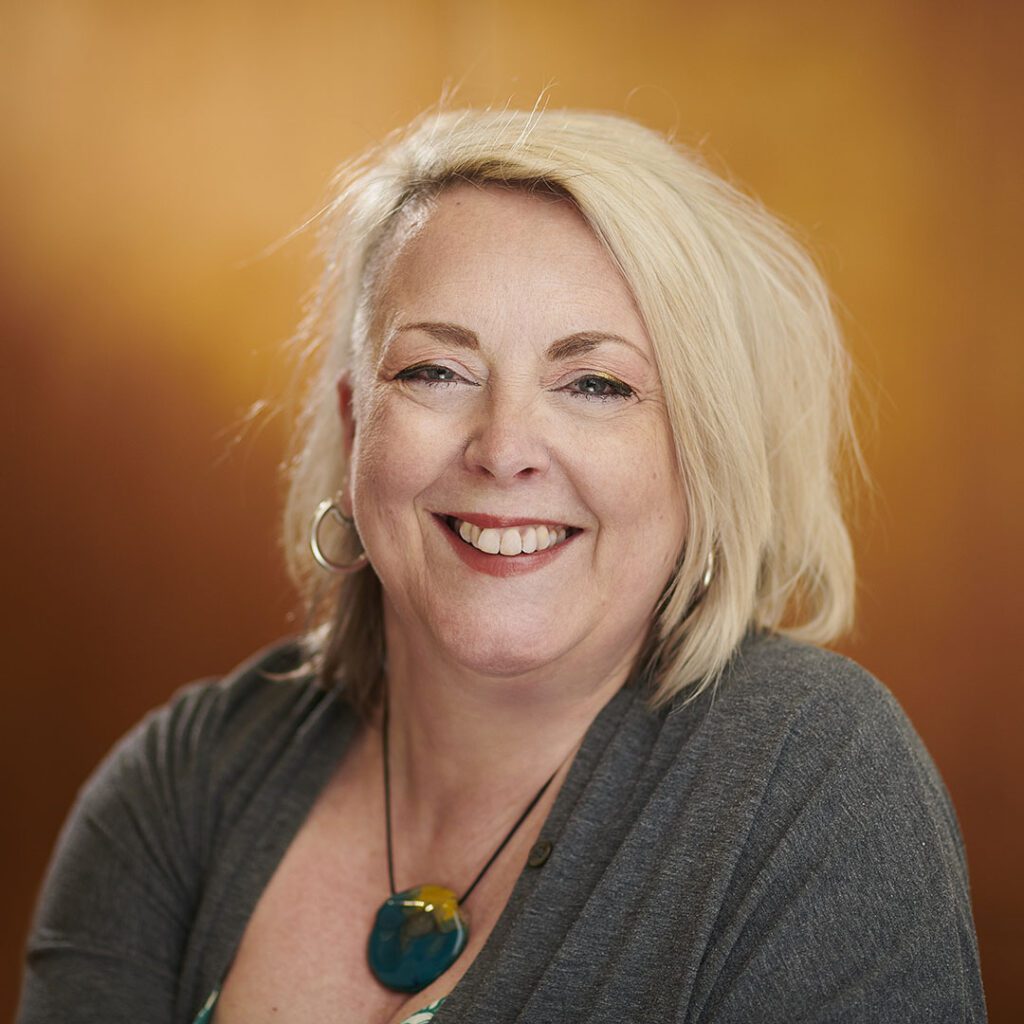
Forest Brothers is a play set just after the end of the second world war. Two Baltic freedom fighters are imprisoned in a Soviet torture cell. The cell is half-filled with water, so they can’t sit or lie down. Pretty grim.
But they’re united in their belief for the cause. They’re brothers in arms. When they’re joined by another prisoner, revealed to be a former Nazi (although once a Nazi…?), the dynamic is changed. Who, now, is the primary enemy of the freedom fighters – the Soviet state or the Nazi? Is this just another part of their captors’ torturous game? Will the forest brothers remain united?
The scene, then, is set.

It’s a weighty topic for any playwright, demanding an understanding of real physical and mental distress.
Edge Hill creative writing graduate Kate Wilson has chosen to tackle the subject matter in her debut play, which had its first read-through with an audience in the University’s Arts Centre at the tail-end of 2022. How did that happen?
“I was watching a programme about these abandoned cities and buildings. In one episode they were looking at an abandoned Soviet prison in Estonia. I thought, what would it have been like for people confined in these cold cells filled with water? And then I wanted to explore that through my own characters to better understand how they would feel.”
Getting into the heads of people is what writers do. Even so, this seemed like a bigger challenge than most. How did she do it?
“You fall into a research trap: who were these prisoners and why were they there, what would have happened to them? There’s so many accounts of these freedom fighters that it was easy to research, delve into why they were fighting, why they’d been put into the cells.”
The ‘research trap’, by the way, is getting sucked into the process of investigating a topic, rather than diving into the actual process of writing.
Every writer procrastinates in their own unique way, says Kate’s tutor, veteran playwright and Reader in Creative Writing at Edge Hill Dr Kim Wiltshire:

“Writers are procrastinators – it’s amazing how many other things come before writing. Working as an academic, teaching, having children – these things mean inspiration needs to be organised. I set aside time in my schedule to ensure that I have writing time – and then very often find something else to do!”
But it’s something that writers are painfully aware of, and Kate’s research habit is just her way of creating plausible characters, falling back on the lessons she learnt on her BA in Creative Writing:
“We’re taught to know your character inside and out, even if you’re not going to explain it all on the stage. So even their backstory, where they’ve come from, their childhood and things like that, that the audience aren’t going to see because it’s not put there on the stage. But for the writer, you need to know those questions to know how your characters would react to each line.”
And the play is moving, profound and disturbing as it exposes the audience to a reality most will never experience. It offers real insight, and it’s not difficult to see how it was awarded Edge Hill’s Dame Janet Suzman Playwriting Prize, which comes with a very handy £1,000 attached.
“I’ve seldom read a play so spare, so threatening, so apt for the times we live in,” said Dame Janet. “Frankly, I didn’t want to change a thing. It ought to be sent to The Royal Court before too long as it’s so timely.”
How did that happen?
Working closely with the cast and crew helped:
“The actors have given a lot of feedback – for them to get into the characters that they’re portraying, they question a lot. As the writer, I need to know the answers. And if I don’t know the answers, I need to ask why? And for the development of Hermann, Joseph, who plays Hermann, had a lot of questions. That highlighted in itself the flaws to this character.”
Oscar-winning scriptwriter William Goldman wrote screenplays for Butch Cassidy and the Sundance Kid, All the President’s Men and The Princess Bride, amongst other films. In his best-selling memoir Adventures in the Screen Trade, he says that an initial screenplay generally bears little resemblance to that used in the final film.
A script is very much a work in progress, it seems:
“Having actors speak them out loud actually changed it for me. And then I would pick up, ‘oh, after that he doesn’t respond in the way that I think that maybe I’ve heard in my head’, it’s not landing in the way that I think it’s going to land.”
Kim Wiltshire believes it’s a great learning experience:

“My first play was a commission for Burnley Youth Theatre called Polarised – I worked with young people across Burnley to understand what had been dubbed the ‘Race Riots’ of 2001. It was a great process and I loved working with those young people. And when it was performed they really owned the play, which was great. I learned to not watch the play, however, to watch the audience, because they will tell you if they want more, less, what’s funny, what’s sad, what’s boring.”
Kate believes audience-watching helped improve the play’s characterisations and dialogue:
“I write in a way that I want to start conversation with the reader or the audience. Hermann’s written in a way that you question whether he’s a spy or whether he’s just tormented and completely innocent, to instil conversation with the audience afterwards. His character took longer to develop. To get into the head of somebody who is completely the opposite of me was very challenging, [but] I realised Hermann actually needed more characterisation, more depth.”
Workshopping your work – inviting feedback from others – is a critical element of the BA (Hons) Creative Writing course:
“It’s all about going through the script, questioning, providing constructive feedback, and just pushing other writers to be the best that they can be. It was teamwork. I miss having peers to bounce ideas off. Workshopping was awkward to begin with, but the thing you crave towards the end.”
Kate remains in touch with her student peers, and as a member of Edge Hill’s Narrative Research Group continues to workshop and collaborate alongside students and lecturers.
It enables Kate to push herself even further as a writer, as she refuses to be pigeon-holed:
“I have a plan to write a comedy script for the theatre next year, which I never contemplated until seeing the read-throughs of Forest Fighters. Looking into the history of why they do readings, especially in comedy, to see where the lines land with the audience, actually gave me the drive to push myself into something else.”
She can say that again. She’s part-way through a Masters in Creative Writing at Edge Hill; has a novel on the go (although she acknowledges every writer does) – a historical fantasy set in Victorian Wales; is already working on her next play; and she’s working on several screenplays, perhaps hoping to follow in the footsteps of inspiring writers such as Craig Mazin, creator of Chernobyl (that East European connection) and co-creator of the tv adaptation of the video game The Last of Us.
She’s certainly following Kim Wiltshire’s advice for any budding writer:
“Don’t stop. Start writing the next one. Understand there will be rejection, there always is. Also – decide what you want, where you want to be in your writing career – that’s the most important one. There’s no point chasing after TV writing opportunities if you really don’t fancy writing for TV! Be clear in your ambitions, and then go for it.”
So what does Kate want from her writing career? It’s very early days. As a mother of young children, she doesn’t have the luxury of giving up the day job just yet:
I’d love to be a full-time writer. But at the moment the most exciting thing is seeing my work on the stage, and being sat in the audience hearing their reaction to the work on the stage.
So Kate just continues to write, and pretty prolifically.
It’s always gratifying to hear anyone refer to Edge Hill as a home from home, and Kate finds [University library] the Catalyst the ideal place to write: “something mentally in me instils creativity there better than at home.”
Surrounded by all those books, let’s just hope she keeps her eyes on the prize, and avoids falling down any research traps.
Find out more about Creative Writing at Edge Hill University
January 24, 2023


